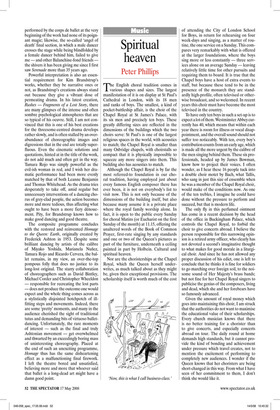Spiritual heaven
Peter Phillips
The English choral tradition comes in various shapes and sizes. The largest manifestation of it is on display at St Paul’s Cathedral in London, with its 18 men and ranks of boys. The smallest, a kind of pocket-battleship affair, is the choir of the Chapel Royal at St James’s Palace, with its six men and precisely ten boys. These greatly differing sizes are reflected in the dimensions of the buildings which the two choirs serve: St Paul’s is one of the largest religious spaces in the world, with acoustics to match; the Chapel Royal is smaller than many Oxbridge chapels, with choirstalls so compact that it is physically impossible to squeeze any more singers into them. This building also has acoustics to match.
Although the Chapel Royal is by far the most referred-to foundation in our choral tradition, having employed just about every famous English composer there has ever been, it is not on everybody’s list to visit now. This is not only because of the dimensions of the building itself, but also because many assume it is a private place where the royal family worship alone. In fact, it is open to the public every Sunday for choral Matins (or Eucharist on the first Sunday of the month) at 11.15, offering the unaltered words of the Book of Common Prayer, first-rate singing by any standards and one or two of the Queen’s pictures as part of the furniture, underneath a ceiling painted in part by Holbein. Cultural and spiritual heaven.
Nor are the choristerships at the Chapel Royal, which the Queen herself underwrites, as much talked about as they might be, given their exceptional provisions. The scholarship itself is worth much of the cost of attending the City of London School for Boys, in return for rehearsing on four week-days and singing, as a matter of routine, the one service on a Sunday. This compares very remarkably with what is offered at the larger foundations, where the boys sing more or less constantly — three services alone on an average Sunday — leaving relatively little time for other pursuits and requiring them to board. It is true that the Chapel boys have a host of extra events to staff, but because these tend to be in the presence of the monarch they are standardly high-profile, often televised or otherwise broadcast, and so welcomed. In recent years this choir must have become the most televised in the country.
To have only ten boys in such a set-up is to expect a lot of them. Westminster Abbey currently has 40, which means that within each year there is room for illness or vocal disappointment, and the overall sound should not suffer too noticeably. With ten, every boy’s contribution counts from an early age, which is made all the more urgent by the calibre of the men singing behind them. These six professionals, headed up by James Bowman, know how to project their voices. I often wonder, as I hear these 16 people tuck into a double choir motet by Bach, what Tallis, who sang in just this size of ensemble when he was a member of the Chapel Royal choir, would make of the conditions now. As one of the ten trebles, I imagine he could have done without the pressure to perform and succeed, but that is modern life.
The only fly in this perfumed ointment has come in a recent decision by the head of the office in Buckingham Palace, which controls the Chapel Royal, to forbid the choir to give concerts abroad. I believe the person responsible for this narrowing opinion is a retired army officer, who clearly has not devoted a second’s imaginative thought to what makes for good morale in a liturgical choir. And since he has not allowed any proper discussion of his edict, one is left to conclude that he thinks it is fine for soldiers to go marching over foreign soil, to the noisome sound of Her Majesty’s brass bands; but not fine for her Chapel Royal singers to publicise the genius of the composers, living and dead, which she and her forebears have so famously advanced.
Given the amount of royal money which goes into maintaining this choir, I am struck that the authorities do not want to maximise the educational value of their scholarships. Every church musician knows that there is no better training for a chorister than to give concerts, and especially concerts abroad on tour. The daily round at home demands high standards, but it cannot provide the kind of bonding and achievement under pressure which travel creates, not to mention the excitement of performing to completely new audiences. I wonder if the Queen knows that her choristers are being short-changed in this way. From what I have seen of her commitment to them, I don’t think she would like it.










































































 Previous page
Previous page